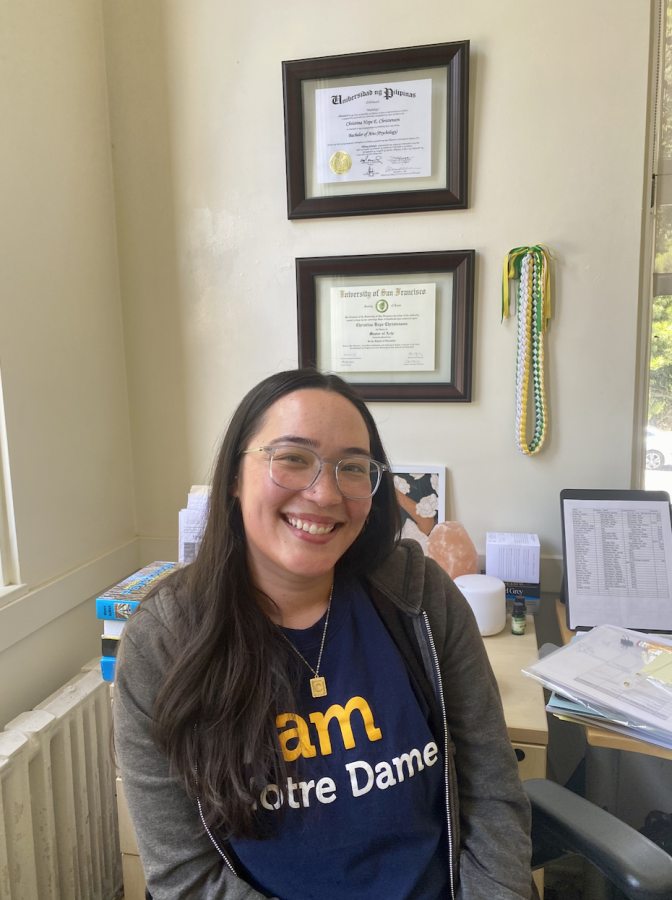Interview with a counselor: How to take care of your mental health this summer
The Catalyst / Mia Muzzi
The Catalyst (TC): It’s common for people to assume that mental health gets better over the summer, but for some it doesn’t. Can you explain a little bit about why mental health might worsen with a lack of structured days?
Christina Christenson (CC): I think it’s safe to say for everybody, your anxiety levels are lower when you know what to expect. And so during the summer, like you said, the days are a little bit less structured. For some people, they take it as an opportunity to be able to do things that they really want or to have the flexibility of the day. Whereas for others, it can be a little bit daunting to have two months off to try to figure out what to do. It is definitely different for everybody though.
TC: What are some techniques you would recommend to maintain good mental health over the summer?
CC: You definitely want to hit a few different types of self care. It could be physical self care, like when you’re moving your body, or there’s mental self care. For most students, summer is a time to be able to focus on other things besides school. It’s a time to do things that are hobbies or sports so that you still stay busy, but with things that you like to do. Obviously you don’t have school in the summer, so sometimes it’s harder for people to meet up with their friends because you don’t have class together. Being able to stay connected through social media is very helpful. Meeting with friends you are not able to see during the school year is also a good way to stay connected. Just staying connected with people who are important to you. Then there’s also spiritual self care, but that doesn’t necessarily have to mean religious. Having time alone is really important too. We get caught up in a very busy daily grind, and summer can be a time take a breath.
TC: What is something you would tell a student who’s struggling with a lack of routine or feeling alone due to not being able to see their friends?
CC: I would say to just start small. Choose to wake up at a specific time every day, so that at least there’s things that you know what to expect throughout the day, and it’s on your terms. For someone who is feeling alone due to not being able to see their peers, I think it’s really convenient nowadays that we can FaceTime and be able to stay connected, even if you’re not able to see each other in person. Summer is also a time for some to be able to connect with people that they haven’t been able to during the school year. If you have friends at different schools it’s a good time to reach out to others that you wouldn’t normally be able to hang out with.
TC: During the summer, we tend to spend a lot more time on electronics like social media or watching TV. What are some things that you could think of that we can do to minimize that?
CC: What even technology tries to do now is you can track your screen time. Or even when you go on TikTok they give you reminders like, “Hey, you’ve been scrolling for a long time.” So I think what would be super helpful is to kind of just check in with yourself maybe every 15-20 minutes to say like, “Okay, I’ve been doing this for this long, should I do something else; Should I go to the bathroom? Should I go drink some water?”And it’s okay to be able to spend time on screen. It’s just you want to keep track of it so that it’s not out of your control.
TC: Do you recommend sleeping in over the summer or do you think that it takes away from a routine?
CC: I think a lot of people are naturally night owls. So taking advantage of the opportunity during the summer to kind of sleep in and go with your natural sleep rhythms could be helpful. Just keep in mind that you do have to adjust to that when we come to school. You really just have to ask yourself, “What’s more helpful for me? Is it going to be easier when we come back in the fall to adjust again? Or should I really just take advantage of being able to sleep in for a couple of months?”
TC: What are your thoughts on taking classes or summer school over the summer? Do you feel this benefits a student’s mental health or adds more stress?
CC: Anything that you’re doing over the summer should be a benefit. If you feel like it adds to your stress then it’s probably not worth it. And if you’re taking a class, I would say it shouldn’t be something that’s required. It should be something that you’re actually just interested in. Maybe a class that isn’t offered at school but you want to take the opportunity to learn more. Community college classes are definitely a popular option. But there’s also online classes that you can definitely talk to your counselor about. But definitely I would say it should be something that’s fun and exciting and not something that you would be taking during the regular school year.
TC: For students who are traveling and don’t necessarily have access to a gym or can’t partake in sports practices, what do you think would be a good way for them to get the exercise that their bodies are used to?
CC: So, exercise can look like many different things. I think nowadays things are a little bit easier in the sense that you can download an app like the Nike Training app is something where you can just follow along with exercises. YouTube also has a lot of different exercises or ideas of things that you could do. But I would say even just walking and that’s something you could do anywhere. But definitely moving your body even if you’re not going to the gym or playing sports is super important.

Mia Muzzi graduated NDB after four years working for The Catalyst. She spent her freshman year as a Staff Writer, then during her sophomore year worked...






